Federal budget 2024: What it means for Gold Coast including Coomera Connector and housing
$430m-plus has been tipped into a Gold Coast infrastructure blow out by the federal government in Tuesday’s Budget amid a multi-billion spend to fire up housing sector. FULL DETAILS
Gold Coast
Don't miss out on the headlines from Gold Coast. Followed categories will be added to My News.
The federal government has tipped more than $430m into the Coomera Connector as it moves to unlock billions of dollars in stalled housing projects.
Treasurer Jim Chalmers brought down his third budget on Tuesday night, announcing only the second surplus in the past 16 years amid uncertain economic times and an election on the horizon
The giant arterial road secured $431.7m for the first stage of the project between Nerang and Coomera to cover the Commonwealth’s 50 per cent share of an $864m cost blow out which was revealed earlier this year.
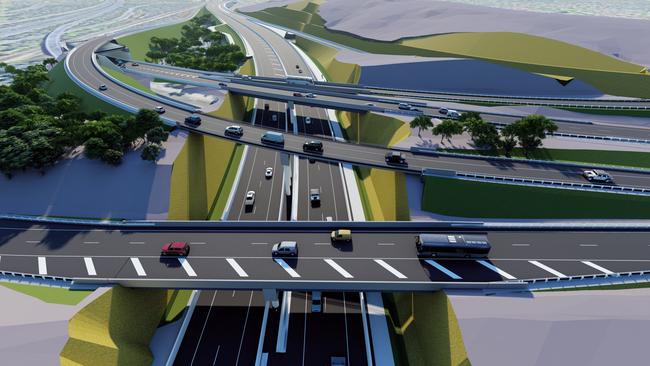
The funding was requested by the state government on the back of the blowout, which was blamed on double-digit market escalation and inflation since the business case was approved in 2021 and the location of contamination including PFAS and asbestos on site.
Other factors include changes to design standards, evolving scope of works through the design process such as making the central package six lanes.
Gold Coast-based Senator Murray Watt said the funding would make a big difference for the project.
“There’s a lot for Gold Coasters to get behind in this budget. A number of major Queensland congestion-busting projects have been funded, including an additional $431.7m for the Coomera Connector Stage 1, an additional $2m for the Coomera Station car park and an additional $39.4m for the relocation of Loganlea Station.
“This Budget is about taking pressure off Queenslanders by putting real money back in their pockets – through tax cuts for every Gold Coast taxpayer, as well as energy bill relief.”
Construction is already well-underway on the first stage, between Coomera’s Shipper Drive and Helensvale Rd.
It will ultimately run between Logan and Carrara’s Nerang-Broadbeach Rd.
It is expected to take up to 60,000 vehicles off the M1 every day and was fully gazetted in 2019 by the state government.
However the project has been repeatedly been hit by cost blowouts and delays which have been slammed by the LNP.
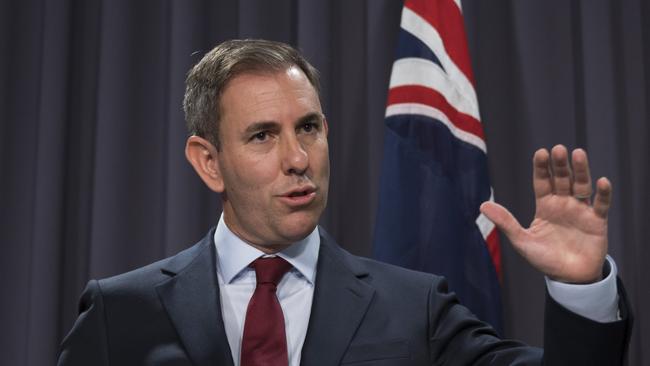
The first sections of the road will progressively begin to open to traffic from late 2025.
But there was little else in funding for the Gold Coast, with neither the city, nor any of its key infrastructure projects mentioned during Dr Chalmers’ speech, which primarily focused on cost-of-living and housing relief.
Mayor Tom Tate said the budget had delivered the goods for the city.
“We welcome the additional $430m funding for the Coomera Connector in the federal budget, to keep this vital project on track,” he said.
“With work continuing on the M1 and Light Rail Stage 3, these three projects continue to progress and they will all contribute to congestion busting across the city.
“Like most Australian’s, cost of living is the number one issue for Gold Coasters, so the $300 energy rebate will assist some households.
“We also welcome increase spending on housing, that will assist in the longer term.”
Dr Chalmers characterised it as a “budget for the here-and-now” and “a budget for the decades to come”.
“More homes means more affordable homes and a better deal for buyers, builders and renters alike,” he said.
“The current housing pipeline is backed up (so) we’ve already allocated $3.5 billion to address bottlenecks and slash red tape – and this budget includes another $1 billion to help states and territories build more housing sooner.
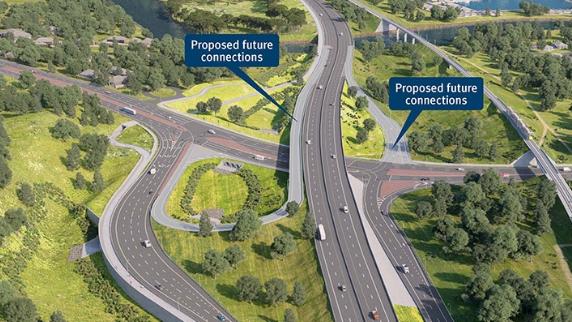
“We’re providing $89 million for 20,000 additional fee-free TAFE and VET places to train more construction workers to do the work we’ll need.”
However, Real Estate Institute of Australia Queensland spokesman Andrew Bell said the measures, while welcome, would do nothing to deal with the immediate housing crisis gripping the city.
“Some of these measures are good but there is too much blockage in the bureaucracy whereas we need policies which can get developments underway sooner than later,” he said.
“The level of certification for buildings are of such a high standard now that the average building is just not interested because it takes eight to ten months to qualify and that is too hard and many of those who work in regional areas (across the state) don’t think it’s worth it.
“It’s one thing to throw money at housing and development but if they never land it is of no benefit.”
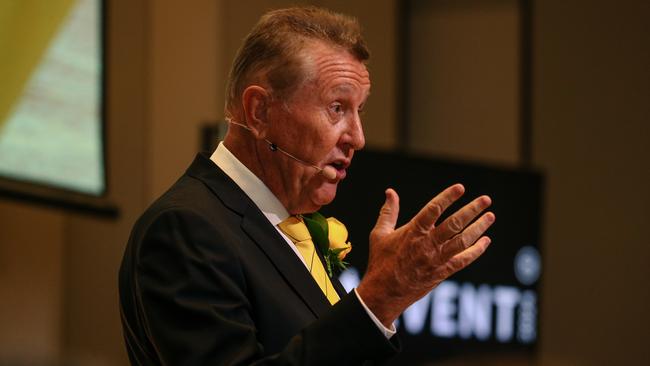
Mr Bell said measures which would provide immediate benefit would be capital gains tax reform, the slashing of infrastructure charges and government incentives for developers to build affordable housing, along with time-frames to ensure their projects are delivered within five years.
The budget contained no funding for critical 2032 Olympic Games transport projects including Stage 4 of the light rail between Burleigh Heads and the border, or the heavy rail extension from Varsity Lakes to Gold Coast Airport
However, in a win for tens of thousands of small business operators across the city, Dr Chalmers announced a surprise continuation of the $20,000 instant asset write-off which was expected to end on June 30, a move which is expected to be welcomed by business groups across the city which had lobbied for the measure.
“We want Australian small businesses to share in the big opportunities ahead as well,” Dr Chalmers said.
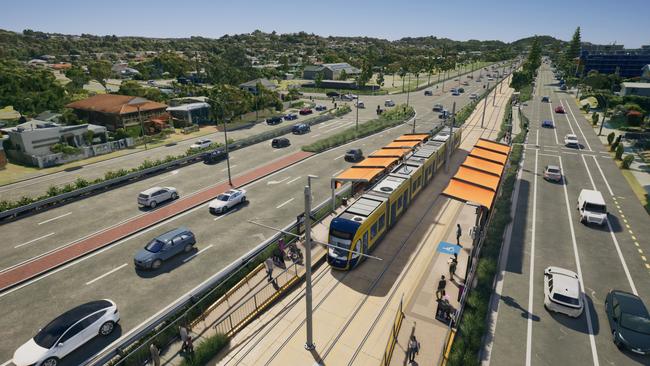
“That’s why we are extending the $20,000 instant asset write-off until 30 June 2025, providing $290 million in cash flow support for up to four million small businesses.
Dr Chalmers announced a $9.3bn budget surplus, despite previous years’ budget papers tipping a deficit.
However forward estimates forecast deficits to return across the next four years.
Dr Chalmers said the economic outlook was “framed in fraught and fragile global conditions”.
“The world economy is resilient in parts but subdued overall (and with) inflation lingering in North America, growth is slowing in China and tepid in Europe, tensions have escalated in the Middle East and persist in Ukraine, global supply chains are fragmenting,” he said.
“This uncertainty combines with cost of living pressures and higher interest rates to slow our economy, with growth forecast to be just 1¾ per cent this financial year and 2 per cent next.
“Treasury is now forecasting inflation could return to target earlier, perhaps even by the end of this year (while) at the same time, around 780,000 jobs have been created under this Government, a record for any first term.
“This is stronger jobs growth than in any major advanced economy, real wages are growing again for the first time in almost three years and business investment is now expected to record its longest annual expansion since the mining boom – and we’re addressing the pressures caused by population growth, with net overseas migration next year now expected to be half what it was last year.”
Gross debt will top $904bn this year before increasing past $1bn in 2025-26
Other key points of the budget include
* $22.7bn across the next decade for the government’s Future Made in Australia manufacturing policy.
* The impact of the government’s revamped stage 3 tax cuts which will come into effect on July 1 and will see every tax payer receive some financial relief.
* A $300m energy rebate for power prices, with small businesses receiving a further rebate.
* $3bn towards cheaper medicine.
*The capping of indexation of student debt, wiping $3bn.
ANALYSIS – WHAT BUDGET REALLY MEANS FOR GOLD COAST
In the three-ring circus that is the federal budget, Treasurer Jim Chalmers is attempting perhaps the most difficult balancing act imaginable – pouring money into the economy without creating inflationary pressure.
Walking this fiscal tightrope is made even more challenging given Dr Chalmers has to also balance both the economic needs of the nation, along with the political needs of the government which is now a year out from the next election.
Make no mistake, this is not a pre-election by any stretch of the imagination – that comes next year – but it is very much a table-setter.
Particularly in Queensland, where Labor holds just five federal seats, including that of Dr Chalmers, there are billions being spent in carefully deployed ways without the sort of splashy big-ticket, high-cost spending a government struggling in the polls would be tempted to nearer to an election.
There is money being spent – see the billions for housing, tax cuts and keeping the Coomera Connector on-track after a blow out, but the government is holding fire for a pre-election spend in the next budget, which is likely to come down between March and April 2025.
A key line can be found on Page 5 of budget paper No. 2 – “Decisions taken but not yet announced and not for publication”.
There’s $955bn set aside for spending in the 2024-25 financial year which the government has yet to announce.
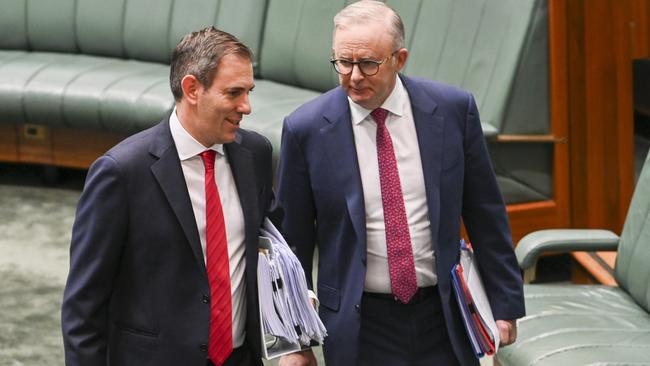
This is the fund which political leaders across the regions will be keeping their eyes and lobbying focused on in coming months in the hopes that a portion will go towards key projects.
For the Gold Coast leaders, including Mayor Tom Tate, this will undoubtedly be Stage 4 of the light rail, which will run from Burleigh to the border via Gold Coast Airport.
While the cost is going up, those not already opposed or hoping to make political hay out of the issue all acknowledge this is a must-have project regardless of the cost and must be delivered urgently before the 2032 Olympic Games.
While real estate and housing advocates are disappointed by the announcing housing measures, arguing they won’t go far enough to reducing the stress on the sector, the heavy lifting here will need to be done by the state government and councils.
With those respective budgets coming in the next month, watch this space.
This budget also reinforces a core project of Labor’s time in office since its 2022 election victory – reframing it as the party of fiscal restraint and sober budget management.
Dr Chalmers desperately wants to bury the Howard-era refrain that Labor cannot manage the economy and is fundamentally spendthrift by nature.
The Morrison Government’s orgy of indiscriminate spending and blowouts during its years in government heavily damaged the Liberal brand for economic management.
Labor is bargaining its slow and steady strategy, along with economically targeted spending ahead of next year’s election, will deliver the goods, not just a second term, but generationally recasting the party as competent mangers.
STAR STILL IN FIRING LINE
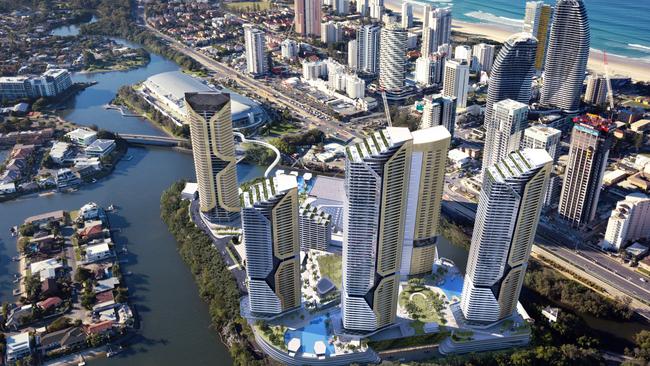
The federal government is still banking on securing a multimillion-dollar windfall from Australia’s struggling casino sector.
The Star Entertainment Group’s Queensland wing, which includes its Gold Coast casino, hotel and residential towers on Broadbeach Island, is one of two gaming giants which the budget records contingent assets against.
The other is SkyCity in Adelaide.
They are facing court action from the Australian Transaction Reports and Analysis Centre (AUSTRAC) over allegedly failing to police against money laundering.
“AUSTRAC alleges that these entities failed to comply with obligations under the AML/CTF Act, including failures to properly assess money laundering and terrorism financing risks, and failures to undertake appropriate customer due diligence,” budget documents read.
“The outcomes of these matters are unknown, including whether any penalties will be imposed by the Court and, if so, the quantum of any penalties.”

While the documents does not spell out the size of the claims against Star, contingent assets are only recorded in the budget if the government expects to net more than $20m in a single financial year or more than $50m across the forward estimates.
The budget documents notes that an “in-principle” agreement has already been reached with SkyCity to pay a penalty, while none has yet been reached with Star, which has endured the loss of several key staff in recent months.
Star Gold Coast CEO Jess Mellor will leave the business in September after resigning in April, with it effective on May 24.
Her exit comes after a string of recent departures, including new group CEO Robbie Cooke, who had started only 18 months ago to rebuild the company after damaging inquiries into the casino operation in NSW and Queensland both deemed Star unfit to hold casino licences.
The company has copped some heavy flak during a new hearing in NSW to decide whether it has made enough cultural change since the inquiries to keep its casino licence.
Former executives have unleashed on leadership troubles and a volley of gaffes, including a cash machine fault which saw gleeful punters withdraw $3.2m over 13 days at The Star Sydney. Star called police on the customers and had them charged.
The hearing revealed Star had planned to misrepresent the loss in February’s half-year results, and had falsified mandatory welfare checks on poker machine players.




